calsfoundation@cals.org
Swifton (Jackson County)
| Latitude and Longitude: | 35°49’18″N 091°07’42″W |
| Elevation: | 249 feet |
| Area: | 0.55 square miles (2020 Census) |
| Population: | 733 (2020 Census) |
| Incorporation Date: | April 26, 1890 |
Historical Population as per the U.S. Census:
|
1810 |
1820 |
1830 |
1840 |
1850 |
1860 |
1870 |
1880 |
1890 |
1900 |
|
– |
– |
– |
– |
– |
– |
– |
– |
– |
206 |
|
1910 |
1920 |
1930 |
1940 |
1950 |
1960 |
1970 |
1980 |
1990 |
2000 |
|
290 |
450 |
488 |
484 |
539 |
601 |
703 |
859 |
830 |
871 |
|
2010 |
2020 |
|
|
|
|
|
|
|
|
|
798 |
733 |
|
|
|
|
|
|
|
|
Swifton is one of several Jackson County cities that were founded along the tracks of the Iron Mountain Railroad. Home to three notable names in baseball, including Baseball Hall of Fame third baseman George Kell, Swifton is also a landmark on Arkansas’s Rock ’n’ Roll Highway 67.
Henry Hileman received a patent to the land on which Swifton would be built on November 27, 1820. Hileman obtained that patent with a scrip recognizing his service to the United States in the War of 1812. Other settlers joined Hileman in the area, and a Methodist church was established in 1860. Until construction of the railroad, however, settlement remained sparse in northern Jackson County.
The Cairo and Fulton Railroad built a line through Jackson County in 1873. The railroad established sawmills every five miles along the line to provide wood for railroad ties and also to fuel the wood-burning steam engines. Reportedly, one of these sawmills was built on land belonging to a family named Swift. They had a daughter, Mary, who evidently told her descendants that the city was named for her family, as a granddaughter of Mary Swift visited the community around 1965 to commemorate the naming.
Swifton was incorporated in 1890. By that time, a one-room log schoolhouse had been built in a cattle pasture near the city. In 1891, the school was replaced with a two-story building in the city. A brick school building was erected in about 1918 and stood until 1966. Early in the twentieth century, Swifton had a single telephone with long-distance service. It was located in the general store owned by Julia Sanford. Around 1909, seven residents formed the Swifton Telephone Company to bring additional service to the city. The company was privately owned by Swifton citizens until 1954, when it was sold to the Public Service Corporation of Tuckerman (Jackson County). A newspaper, the Swifton Sentinel, was published briefly in Swifton in 1910. On April 10, 1929, Arkansas’s only F-5 tornado, known as the Sneed Tornado, passed near Swifton as it tore through Jackson County.
During the 1950s, many rock and roll acts performed at the King of Clubs roadhouse just north of Swifton, including Elvis Presley, Johnny Cash, and Conway Twitty. The roadhouse burned down in December 2010. In 2009, the Arkansas General Assembly designated old U.S. Highway 67 the “Rock ’n’ Roll Highway” because of venues such as the King of Clubs.
Swifton consolidated into the Jackson County School District, which also includes Tuckerman and Grubbs (Jackson County), in 2004. Swifton Middle School serves about 180 students; the elementary school and high school are in Tuckerman.
Joel Anderson, who grew up in Swifton, became a significant figure at the University of Arkansas at Little Rock (UA Little Rock) for over four decades, moving up through the positions of assistant professor, professor, dean, provost, vice chancellor, and finally chancellor.
George Kell was born in Swifton in 1922. Kell played for five major league baseball teams between 1944 and 1957. He was selected for the All-Star team ten times and was elected to the Baseball Hall of Fame in 1983. One of Kell’s brothers, Skeeter, also played major league baseball; their other brother, Frank, died while serving in the U.S. Army in Europe during the occupation of Germany following World War II. George Kell was a television and radio announcer for the Detroit Tigers for almost forty years following his retirement from baseball. He also owned and operated a farm near Swifton until his death in 2009. The year after he died, the post office in Swifton was named for him.
Swifton is also home to another baseball figure, Bobby Winkles. Winkles, who was born in Tuckerman but attended school in Swifton, was coach of the Arizona State University baseball team from 1959 to 1971 and then became a major league baseball coach. He managed the California Angels in 1973 and 1974 and then the Oakland Athletics in 1977 and 1978. His teams won 170 games and lost 213 under his leadership.
Most of the residents of Swifton are of European descent, according to the 2010 U.S. census. Eight citizens in the census were counted as African American and nine as Hispanic. The city has six churches—Baptist, Methodist, Church of Christ, Assembly of God, Abiding Faith, and a Full Gospel Deliverance Ministry—and also has one café and two liquor stores, as well as a honky tonk. Swifton has two properties listed on the National Register of Historic Places: the New Home School (built circa 1915) and a Phillips 66 Station (circa 1925).
For additional information:
Eatman, Bertha Bush. “Memories of Early Swifton Schools.” Stream of History 5 (October 1967): 11–12.
Heard, Kenneth. “Post Office Renamed for Native Son.” Arkansas Democrat-Gazette, August 29, 2010, pp. 1B, 8B.
Nicholson, Beatrice. “History of Telephone Service at Swifton.” Stream of History 15 (April 1977): 23–26.
———. “Swifton’s Newspaper of 1910.” Stream of History 15 (October 1977): 31–37.
Trice, Claud Pride. “The History of the Methodist Church in Swifton, Arkansas.” Stream of History 21 (June 1984): 3–5.
Steven Teske
Butler Center for Arkansas Studies
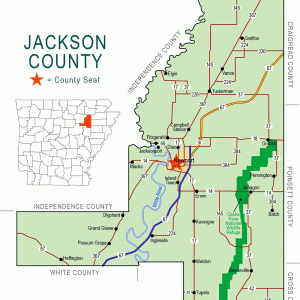 Jackson County Map
Jackson County Map 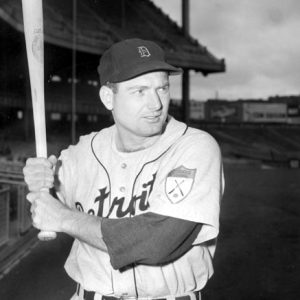 George Kell
George Kell 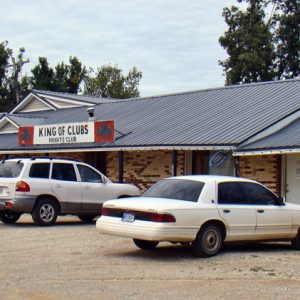 King of Clubs
King of Clubs  Swifton
Swifton 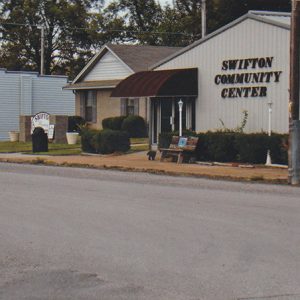 Swifton Community Center
Swifton Community Center 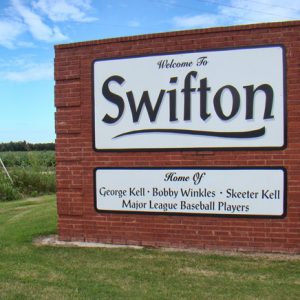 Swifton Sign
Swifton Sign 




Comments
No comments on this entry yet.